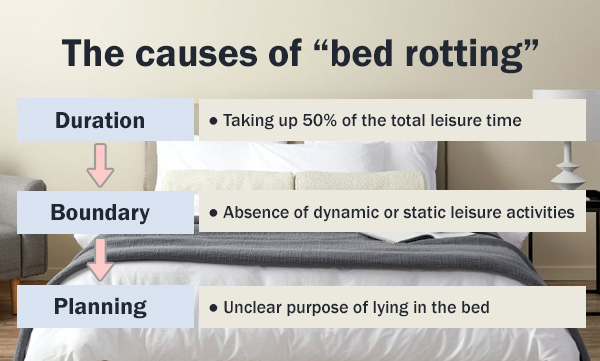
Topic: The Impact of Prolonged "Bed Rotting" on Mental Health
Date: August 2nd, 2023 (Wednesday)
Speaker: Ms Lee Li Li, Clinical Psychologist
In the Z era, "bed rotting" could be a form of self-relaxation or self-care, but its healthiness depends on the specific context.
If an individual only engages in a "static" mode during their relaxation time, devoid of any dynamic activities, it can be considered unhealthy. On the contrary, if there's a well-planned approach that includes both dynamic and static activities, with a maximum of 4 hours spent in bed out of an 8-hour relaxation period, and the remaining 4 hours allocated to dynamic activities such as exercise and social interaction, then this would be a healthy practice. Maintaining a balance between activity and rest is crucial for maintaining good mental health.

Date: August 2nd, 2023 (Wednesday)
Speaker: Ms Lee Li Li, Clinical Psychologist
In the Z era, "bed rotting" could be a form of self-relaxation or self-care, but its healthiness depends on the specific context.
If an individual only engages in a "static" mode during their relaxation time, devoid of any dynamic activities, it can be considered unhealthy. On the contrary, if there's a well-planned approach that includes both dynamic and static activities, with a maximum of 4 hours spent in bed out of an 8-hour relaxation period, and the remaining 4 hours allocated to dynamic activities such as exercise and social interaction, then this would be a healthy practice. Maintaining a balance between activity and rest is crucial for maintaining good mental health.

- Imbalance in daily functioning
● Spending excessive time in bed can lead to an imbalance in daily functioning. - Disruption of circadian rhythms
● Prolonged bed rest might disrupt natural circadian rhythms, causing sleep disturbances and fatigue. - Reduced recharge capability
● Spending excessive time in bed can lead to physical and psychological fatigue. Lack of dynamic activities can result in insufficient physical movement. Additionally, not accomplishing planned tasks may lead to feelings of guilt and a lack of mental rejuvenation. - Association of bed with wakefulness
● Extended periods in bed can alter the perception of the bed itself, making it difficult to associate the bed solely with sleep and impacting sleep quality. - Diminished comfort zone for motivation
● Spending extended time in bed while using devices and immersing oneself in the virtual world can detach individuals from reality. This detachment can result in a lack of problem-solving abilities and reduced positive motivation towards real-world challenges.
Signs of Psychological Distress
- Low self-worth
● Negatively perceiving the world and lacking the ability to handle situations while spending time negatively in bed can lead to an inconsistent cognitive view of reality, resulting in diminished self-worth. - A sense of helplessness
● Self-doubt, lack of motivation to complete tasks, and a constant feeling of physical and mental exhaustion can contribute to a sense of helplessness. Activities that were once interesting may feel too difficult to engage in. - Decreased resilience to stress
● Reduced capacity to handle stress in daily life due to feelings of helplessness and low self-worth can result in being overwhelmed by minor issues - Insomnia
● Insomnia can arise from the combination of low self-worth, a sense of helplessness, and stress. - Escapist fantasies
● In response to an inability to cope effectively with real-life issues, individuals might develop psychological disorders such as depression, anxiety, or delusional disorders, leading to escapist fantasies.
Consequences of "Bed rotting"
- Inability to recognize one's abilities
● Low self-worth and feelings of helplessness prevent individuals from accurately recognizing their own capabilities. - Inability to cope with normal life stressors
● Instability in mental state leads to reduced resilience against regular life stressors, resulting in the choice to escape and further engage in "bed rooting" as a coping mechanism. - Ineffectiveness in learning or working
● Even with effort, individuals are unable to perform well in learning or work endeavors. - Inability to contribute to one's community
Note: The above content is adopted from 8TV, “Living Delights”: "The Impact of Prolonged 'Bed Rotting' on Mental Health." on 2.8.2023 (Wednesday). For further information and assistance, please contact us.





